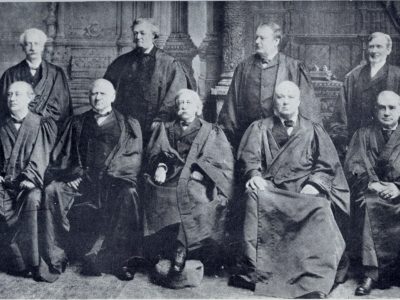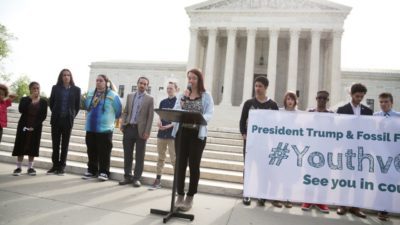constitutional law
EPA v. the Inspector General
Surprise, surprise, EPA has tried to stonewall an investigation.
EPA’s Acting Inspector General Charles J. Sheehan took the extraordinary step last week of notifying Congress that EPA was stonewalling his investigation of potential misconduct involving EPA’s Chief of Staff. This was a gutsy move for Sheehan, especially given the extra vulnerability created by his Acting status. Sheehan, it is worth noting, is a career …
Continue reading “EPA v. the Inspector General”
CONTINUE READINGThe Pro-Environmental Lochner Court
How a conservative Court defended environmental protection a century ago.
Like today’s Court, the Supreme Court a century ago was dominated by conservatives. The Lochner era, from around 1900 to 1935, was named after the most notorious case of that period. The Lochner case, which struck down a maximum hours law for workers, epitomized the conservative Supreme Court of that era. Yet that conservative Court …
Continue reading “The Pro-Environmental Lochner Court”
CONTINUE READINGClearing the Air
The DC Circuit upholds a major air regulation.
On Friday, the D.C. Circuit decided Murray Energy v. EPA. The court upheld EPA’s health-based 2015 air quality standards for ozone against challenges from industry (rules too strong) and environmental groups (rules too weak). However, it rejected a grandfather clause that prevented the new standards from applying to plants whose permit applications were in-process when …
Continue reading “Clearing the Air”
CONTINUE READINGWhat’s Wrong with Juliana (and What’s Right?)
The odds against the “children’s case” are bad and getting worse. But there’s a valid insight at its core.
Juliana v. United States, often called the “children’s case,” is an imaginative effort to make the federal government responsible for its role in promoting the production and use of fossil fuels and its failure to control carbon emissions. They ask the court to “declare the United States’ current environmental policy infringes their fundamental rights, direct the …
Continue reading “What’s Wrong with Juliana (and What’s Right?)”
CONTINUE READINGThe Anthropocene and public law
Major doctrinal changes could occur in constitutional law, administrative law, criminal law
In this post, I will discuss ways in which the Anthropocene might affect public law doctrines, focusing on constitutional law, administrative law, statutory interpretation and criminal law. Again, the changes here are driven by three characteristics of the interaction of the Anthropocene with the legal system that I have developed in my prior posts: a …
Continue reading “The Anthropocene and public law”
CONTINUE READINGThe Misleading Argument Against Delegation
Agency rulemaking is limited in ways that are far different from legislative lawmaking.
It’s commonplace to say that agencies engage in lawmaking when they issue rules. Conservatives denounce this as a violation of the constitutional scheme; liberals celebrate it as an instrument of modern government. Both sides agree that in reality, though not in legal form, Congress has delegated its lawmaking power to agencies. But this is mistaking …
Continue reading “The Misleading Argument Against Delegation”
CONTINUE READINGRegulators Between a Rock and a Hard Place: The Extraterritorial Dilemma
Current dormant commerce clause doctrine creates an incredible dilemma for state lawmakers. No matter what they do, they are at serious risk of attack under the dormant commerce clause. Here’s an example. Suppose a state wants to move its own electricity generators from fossil fuels to renewable energy. For instance, the state might require that …
Continue reading “Regulators Between a Rock and a Hard Place: The Extraterritorial Dilemma”
CONTINUE READINGThe Right-Wing Noose Tightens on Recess Appointments
Republican judges are continuing to do their best to hamstring the Obama Administration: six days ago, the Third Circuit joined the DC Circuit in restricting recess appointments to intersession recesses. Intrasession recesses, which, as the Court noted, were made routine under Ronald Reagan and used nearly 150 times by George W. Bush, are now unavailable. …
Continue reading “The Right-Wing Noose Tightens on Recess Appointments”
CONTINUE READINGAre Filibusters of Executive Branch Nominees Constitutional?
President Obama’s announcement today making three nominations to the National Labor Relations Board should remind us that the GOP is the party of permanent constitutional crisis. It has been quite clear from the beginning of the Obama Administration that the Republicans simply have no interest in allowing the NLRB to function. That shouldn’t be much …
Continue reading “Are Filibusters of Executive Branch Nominees Constitutional?”
CONTINUE READINGDoes the President Even Need the Senate to Confirm Appointees?
Damn. I suppose that it’s an occupational hazard of law professors that they kick around an idea, only to find that someone has beaten them to the punch. Well, Harvard’s Matthew Stephenson has done that to me, sort of, with an essay in the most recent volume of the Yale Law Journal entitled, Can the President Appoint Principal Executive …
Continue reading “Does the President Even Need the Senate to Confirm Appointees?”
CONTINUE READING







